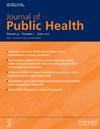地震对妇女的影响:评估图尔基耶以 Kahramanmaraş 为中心的地震后妇女的心理健康情况
IF 3.6
4区 医学
Q1 PUBLIC, ENVIRONMENTAL & OCCUPATIONAL HEALTH
引用次数: 0
摘要
背景 地震对妇女的影响尤为严重,并加剧了性别和社会不平等。本研究旨在调查土耳其地震对妇女的心理影响及其相关因素。方法 这是一项基于调查的研究。我们收集了居住在受地震影响最严重城市的 498 名女性的数据。结果 参与者的平均年龄为 27.72±5.4 岁。超过 78% 的参与者至少失去了一位家庭成员,43.7% 的参与者至少失去了一个孩子。简短症状量表(BSI)平均得分为 100.8(标准差 = 8.37),全球严重程度指数为 1.9(标准差 = 0.16)。回归分析表明,受教育程度越高,大多数 BSI 指标的结果越差。失去家人、避难所和受伤状况也是预测 BSI 分量表中若干心理健康结果的因素。结论 地震严重影响了妇女的福祉,并可能对整个家庭产生更广泛的影响。迫切需要在危机的应对和恢复阶段提供社会心理干预,以满足受灾妇女的需求。这包括提供基本需求,同时关注妇女的特殊需求,恢复社会网络,解决基于性别的暴力问题,并为需要进一步支持的妇女提供对性别问题有敏感认识的专门干预措施。本文章由计算机程序翻译,如有差异,请以英文原文为准。
The impact of earthquakes on women: assessing women's mental health in aftermath of the Kahramanmaraş-centred earthquake in Türkiye
Background Earthquakes disproportionately affect women and exacerbate gender and social inequalities. This study aims to investigate the psychological impact of the earthquake in Türkiye on women and the associated factors. Methods This is a survey-based study. We collected data from 498 women residing in cities most affected by the earthquake. Results Participants’ mean age was 27.72 ± 5.4. Over 78% of the participants lost at least one family member, and 43.7% lost at least one child due to the earthquake. The mean average of Brief Symptom Inventory (BSI) scores was 100.8 (SD = 8.37), and the Global Severity Index was 1.9 (SD = 0.16). Regression analysis showed that higher education levels predicted poor outcomes across most BSI dimensions. Losing a family member and shelter and injury status were also predictors for several mental health outcomes of the BSI subscales. Conclusions Earthquakes significantly impact women’s well-being and may have a broader impact on the whole family. There is an urgent need to provide psycho-social interventions in the response and recovery phases of the crisis to meet the affected women’s needs. This includes providing basic needs with attention to women-specific needs, restoring social networks, addressing gender-based violence and providing gender-sensitive specialized interventions for those who need further support.
求助全文
通过发布文献求助,成功后即可免费获取论文全文。
去求助
来源期刊

Journal of Public Health
医学-公共卫生、环境卫生与职业卫生
CiteScore
7.40
自引率
2.30%
发文量
120
审稿时长
6-12 weeks
期刊介绍:
Previous Title Zeitschrift für Gesundheitswissenschaften, Previous Print ISSN 0943-1853, Previous Online ISSN 1613-2238.
The Journal of Public Health: From Theory to Practice is an interdisciplinary publication for the discussion and debate of international public health issues, with a focus on European affairs. It describes the social and individual factors determining the basic conditions of public health, analyzing causal interrelations, and offering a scientifically sound rationale for personal, social and political measures of intervention. Coverage includes contributions from epidemiology, health economics, environmental health, management, social sciences, ethics, and law.
ISSN: 2198-1833 (Print) 1613-2238 (Online)
 求助内容:
求助内容: 应助结果提醒方式:
应助结果提醒方式:


